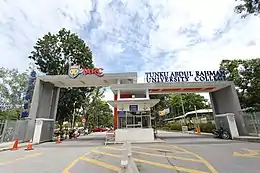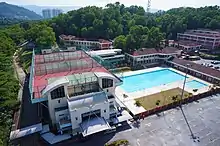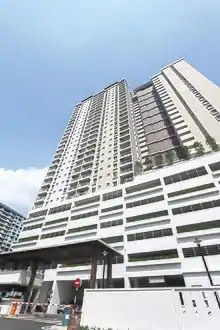Tunku Abdul Rahman University College
Tunku Abdul Rahman University College, abbreviated TAR UC, is a non-profit, private university college in Malaysia. Named after the country's first prime minister, Tunku Abdul Rahman, the school was founded in 1969 as Tunku Abdul Rahman College (or TAR College) by the Malaysian Chinese Association (MCA). On 2 May 2013, it officially became a university college. TAR UC is one of the largest and oldest institutions of higher learning in Malaysia with more than 210,000 students having passed through its doors.
Kolej Universiti Tunku Abdul Rahman (Malay) | |
.JPG.webp) | |
Former names | Tunku Abdul Rahman College (1969–2013) |
|---|---|
| Motto | Beyond Education |
| Type | Private |
| Established | 1969 |
| Chairman | Dato’ Sri Liow Tiong Lai |
| President | Prof Ir Dr Lee Sze Wei |
| Students | About 28,000 |
| Location | 3.215118°N 101.728345°E |
| Campus | Kuala Lumpur Main Campus Penang Branch Campus Perak Branch Campus Johor Branch Campus Pahang Branch Sabah Branch |
| Affiliations | ACCA,[1] CIMA,[2] MAICSA,[3] FPAM,[4] ICAEW,[5] CPA Malaysia,[6] CPA Australia,[7] FAA,[8] CILTM,[9] CIM,[10] BEM,[11] RISM,[12] BQSM,[13] BOVAEP, LAM, IKM |
| Website | tarc |
TAR UC's main campus covers 186 acres (75 ha) at Jalan Genting Kelang in Malaysia's capital, Kuala Lumpur. The university college also has five branches across Malaysia, in the states of Penang, Perak, Johor, Pahang and Sabah. The first branch campus, in Penang, began at a temporary location in 1994 before moving to Tanjung Bungah five years later. The second and third branch campuses were founded in Kampar, Perak and Johor in 1998, and the Pahang faculty branch was established in 1999. The Sabah faculty branch was founded in 2002 in Sabah, East Malaysia.
The university college has a student population of over 28,000, including international students from 24 countries including China, Hong Kong, Mauritius, Papua New Guinea, India, Algeria, Brunei, Sri Lanka, Somalia, Pakistan, United Kingdom, Syria and Yemen etc. Over 50 years since its inception, TAR UC has produced more than 210,000 alumni.
TAR UC is the only institution in the world to conduct the Internally Assessed ACCA Fundamentals programme,[14] and the only institution in Malaysia to be granted the Graduate Gateway status by the Chartered Institute of Marketing.[15]

History
In the early years of Malaysian independence, there was a lack of opportunity to pursue higher education. An institution of higher learning was suggested by Malaysian Chinese Association president Tun Tan Siew Sin. Tan initially suggested the Chinese-language Merdeka University, which was rejected by the government. As a compromise, an English-medium college was proposed. In April 1968, Tan appointed a working team (chaired by Tan Sri Khaw Kai Boh) to make recommendations for an institution of higher learning.[16]
Its blueprint was submitted to the government, and received the support of Minister of Education Mohamed Khir Johari. The working team estimated that it would require RM 20 million to set up the college, and the government agreed to provide the financial assistance on a dollar-for-dollar basis. Prime Minister Tunku Abdul Rahman consented to the college being named for him.
TAR College began operations on 24 February 1969 with its School of Pre-University Studies and an initial enrollment of 764 students. A 15 September 1972 Instrument of Government provided the legal framework for the administration of the college. Minister of Education Tun Hussein Onn presented the instrument to Tan Siew Sin, the first college president. To raise funds for a campus in Kuala Lumpur, the MCA launched a national fundraising campaign in 1972 led by MCA publicity director Lee San Choon.
In February 1973, the government approved the allocation of land for the main Kuala Lumpur campus in Setapak. The ground-breaking ceremony was officiated by Rahman in August 1973. Phase one, including an administrative building, a library, two laboratory blocks, one large and eight small lecture theatres and a canteen, was completed in 1976.
Fundraising activities in the 1990s, such as the nationwide TAR College Fund-Raising Campaign, Taxithon, Walkathon, TAR College Torch Run and Motorthon, were led by TAR College Council chairman Ling Liong Sik. Expansion continued under the leadership of TAR College Council chairmen Ong Ka Ting and Chua Soi Lek. Since its 2013 upgrade to a university college, TAR UC continued its steady development under the leadership of Liow Tiong Lai. The latest infrastructure development, the new phase of the Penang branch campus which began on 7 December 2015, includes a three-storey library building, two four-storey faculty blocks and a twin lecture-theatre hall.
Institutional Awards
Asia Pacific CSR Awards 2016
TAR UC was accorded the Excellence in Education Improvement award in the Asia Pacific CSR Awards 2016 under the award category of Socially Responsible Company in Education Improvement on 27 September 2016.[17]
Premier Digital Technology Institution
TAR UC was recognised with the Premier Digital Tech Institution status by the Malaysia Digital Economy Corporation (MDEC) and the Ministry of Higher Education in 2017. This status was renewed again in 2019.[18]
SETARA 5-Star Ranking
TAR UC obtained SETARA 5-Star rating for the year 2018/2019 under the University Colleges category by the Ministry of Higher Education, in its inaugural participation.
Faculties
Faculty of Accountancy, Finance and Business (FAFB)
Programmes are offered at diploma, undergraduate and/or postgraduate levels in:
- Accounting
- Accounting and Finance
- Banking and Finance
- Business Administration
- Business Economics
- Commerce
- Corporate Administration
- Corporate Governance
- E-commerce & Marketing
- Economics
- E-marketing
- Entrepreneurship
- Finance
- Finance & Investment
- Human Resource Management
- International Business
- Investment Management
- Logistics & Supply Chain Management
- Marketing
- Retail Management
Accreditation
TAR UC is the only institution in the world to be accorded the exclusive privilege to run the Internally Assessed ACCA Applied Knowledge and Applied Skills level examinations where students of the Bachelor of Commerce (Honours) programme are granted exemptions from all 9 papers of this level upon completion of their second year of study.
TAR UC students under the Bachelor of Accounting (Honours) programme are granted conditional exemptions for all the 9 Applied Knowledge and Applied Skills level papers upon graduation.
TAR UC has also been recognised as a CIMA Global Learning Premium Partner where students under the Bachelor of Accounting (Honours) programme are granted the maximum exemption of 11 out of 16 papers of CIMA.
Additionally, TAR UC is the first and only CIM Graduate Gateway accredited university in Malaysia where students under the Bachelor of Business (Honours) in Marketing programme are given exemption on Accreditation of Prior Learning (APL) basis from one out of three modules of the CIM Diploma in Professional Marketing.
Other accreditations and exemptions secured by relevant FAFB programmes are as follows:
- ICSA: Exemption for 3 out of 7 papers (Bachelor's degree), and full exemption for all papers (Master's degree).
- ICAEW: Exemption for 8 out of 15 papers.
- MICPA: Exemption for 4 out of 9 papers.
- CPA Australia: Exemption for 6 out of 12 papers.
- FPAM: Exemption for 1 out of 4 papers.
Faculty of Engineering and Technology (FOET)
Programmes are offered at diploma, undergraduate and/or postgraduate levels in:
- Mechatronics
- Electrical and Electronics Engineering
- Engineering Science
- Mechanical Engineering
- Mechanical & Manufacturing Engineering
- Electronic (Communication) Engineering
- Telecommunication Engineering
Accreditation
TAR UC offers engineering programmes that are accredited by the Engineering Accreditation Council, Board of Engineers Malaysia.
Faculty of Built Environment (FOBE)
Programmes are offered at diploma and undergraduate levels in:
- Architecture
- Interior Architecture
- Building
- Real Estate Management
- Construction Management & Economics
- Quantity Surveying
Accreditation
FOBE programmes are designed and delivered in accordance with the requirements of and/or accredited by the respective statutory boards and/or the following professional bodies:
- Board of Quantity Surveyors Malaysia (BQSM)
- Board of Valuers, Appraisers, Estate Agents and Property Managers Malaysia (BoVAEP)
- Royal Institution of Surveyors Malaysia (RISM)
- Board of Architects Malaysia (Lembaga Arkitek Malaysia, LAM)
Faculty of Applied Sciences (FOAS)
Programmes are offered at diploma, undergraduate and/or postgraduate levels in:
- Analytical Chemistry
- Bioscience with Chemistry
- Chemistry & Biology
- Food Science
- Sports & Exercise Science
- Aquaculture
- Applied Physics (Instrumentation)
Accreditation
Relevant TAR UC programmes are endorsed by Institut Kimia Malaysia (IKM) and graduates of these programmes may join IKM as a member after gaining two years’ working experience in chemistry-related industries and recognised as “Registered Chemists" in Malaysia.
TAR UC is also listed on the list of universities in the Food Analyst Registration Information System in Malaysia (FaRIS). Graduates from relevant TAR UC programmes may apply as registered food analysts online with the Ministry of Health under the Food Analyst Act which was passed in 2011.
Faculty of Computing and Information Technology (FOCS)
Programmes are offered at diploma and undergraduate levels in:
- Computer Science
- Data Science
- Business Information Systems
- Information Security
- Information Systems Engineering
- Interactive Software Technology
- Internet Technology
- ICT Applications / ICT Support Systems
- IT Entrepreneurship
- Management Mathematics with Computing
- Mobile Application Development
- Microelectronics
- Software Engineering
- Software Systems Development
Industry Professional Certification
Students are prepared for Industry Professional Certification in the following focus areas:
- Cisco Certified Network Associate (CCNA)
- Cisco Certified Network Associate Security (CCNA Security)
- CompTIA Security+
- CompTIA Linux+
- CompTIA A+
- ISTQB Certified Tester Foundation Level (CTFL)
Faculty of Social Science and Humanities (FSSH)
Programmes are offered at diploma, undergraduate and/or postgraduate levels in:
- Counselling/psychology
- English with Drama
- Hospitality Management
- Tourism
- Hospitality & Catering Management
- Baking & Cake Artistry
- Culinary Arts
- Food Service
- Event Management
- Early Childhood Education
Faculty of Communication and Creative Industries (FCCI)
Programmes are offered at diploma and undergraduate levels in:
- Advertising
- Communication Studies
- Broadcast Communication
- Journalism
- Media Studies
- Public Relations
- Graphic Design
- Multimedia Design
- Fashion Design
Centre for Pre-University Studies (CPUS)
The Centre for Pre-University Studies (CPUS), formerly known as the School of Pre-University Studies) was established in 1969 and offers Malaysian Qualifications Agency accredited programmes in:
- Foundation in Science
- Foundation in Arts
- Foundation in Accounting
- Foundation in Business
- Foundation in Computing
- Foundation in Engineering
Centre for Postgraduate Studies and Research (CPSR)
The CPSR was founded in October 2013 to provide infrastructure and support to TAR UC to conduct postgraduate-level programmes and assist academic staff to pursue scholarly research. The centre is tasked with the admission of the college's postgraduate students (those studying for master's, PhD and other graduate qualifications).
The centre manages the college's research grants. In 2014, the college secured three Fundamental Research Grant Scheme grants from the Ministry of Education (totaling RM376,400) for 2014-2016.
CPSR currently offers the following postgraduate and doctorate programmes:
| Master's Degree | |
|---|---|
| By Coursework | By Research |
| Master of Accounting and Finance | Master of Arts (Psychology) |
| Master of Architecture | Master of Computer Science |
| Master of Business Administration | Master of Engineering Science |
| Master of Corporate Governance | Master of Information Technology |
| Master of Investment Management | Master of Science |
| Master of Science (Life Science) | |
| Master of Science (Food Science) | |
| Master of Science in Built Environment | |
| Master of Science in Mathematical Sciences | |
| Master of Science in Sport Science | |
| Doctoral Degree | |
| Doctor of Philosophy (Computer Science) | |
| Doctor of Philosophy (Information Technology) | |
| Doctor of Philosophy (Life Sciences) | |
| Doctor of Philosophy (Mathematical Sciences) | |
| Doctor of Philosophy (Physical Science) | |
| Doctor of Philosophy (Sports Science) | |
| Doctor of Philosophy in Built Environment | |
| Doctor of Philosophy in Psychology | |
Main Campus Facilities
Sports

With 186 acres of land and surrounded by lush and hilly greenery, the Kuala Lumpur Main Campus promises an inspiring and conducive study environment. Apart from a vibrant learning environment, the Main Campus is also equipped with top-notch recreational and academic facilities that help students excel both in and out of the classroom.
Sports Complex
- Gymnasium
- Dancing room
- Badminton courts
- Indoor basketball court
- Roof top tennis court.
Clubhouse
- Olympic-sized swimming pool
- Squash courts
- Snooker table
Outdoor facilities
- Football field
- Futsal courts
- Handball courts
- Volleyball courts
- Basketball courts
- Jogging track
Academic Facilities
- Integrated Innovation Hub (I2 Hub)
- Student Career Development Centre (SCDC)
- Library
- Cyber Centre
- IBM Centre of Excellence
- Investment share trading room
- Broadcast laboratories and studios
- Video and audio lab
- Photography studio
- Newsroom
- Multimedia labs
- Fashion studios
- Creative workshops
- V Gallery
- Chemistry labs
- Biotechnology labs
- Sports and exercise science labs
- Physics labs
- Networking lounge
- Pitching hall
- Co-working space
On-campus hostel

The hostel consists of 10 blocks of 5-storey building with 1,000 standard rooms which can accommodate 2,000 students. Each room is on a twin-sharing basis with 300 rooms allocated for male and 700 rooms for female in separate blocks. Each floor has its own common bathrooms, toilets, pantry, water dispenser and drying area.
Off-campus accommodation - Teratai Residency
The student residence is a 28-storey building which consists of 448 units with 3 air conditioning/non-air conditioning rooms in each unit. It can accommodate at least 1,500 students. Amenities in the student residence include gym room, swimming pool, multipurpose hall, barbeque area, cafeterias, study rooms, convenience and stationery shop, hot/cold water dispensers, self-service laundry machines, and Surau. Each unit is complete with bathrooms, toilets, pantry, fridge, induction cooker, sofa, flat screen TV, shoes rack and drying areas. Beds, cupboards, study tables, chairs, bookshelves, ceiling fan are provided in every room.
Transportation
TAR UC has a fleet of air-conditioned buses to ferry students between the Kuala Lumpur Main Campus and nearby residential areas and LRT stations.
Computing facilities
In addition to Internet computers in the library, more are at the Cyber Centre. Wi-Fi hotspots are across the college, including the library and canteens.
Partner Institution
Notable Alumni
- Saifuddin Nasution Ismail, Minister of Domestic Trade and Consumer Affairs Malaysia (2018 - 2020)
- Salahuddin Ayub, Minister of Agriculture and Food Industries Malaysia (2018 - 2020)
- Chow Kon Yeow, Chief Minister of Penang (2018 - Present)
- Chong Eng, Penang State Executive Councillor (2013 - Present)
- Teo Kok Seong, Negeri Sembilan State Executive Councillor (2018 - Present)
- Liow Cai Tung, Johor State Executive Councillor (2018 - Present)
- Upul Liyanage, Sri Lanka's veteran media official
- Andrew Tan (陈势安), singer
- Gan Mei Yan, actress & host
- Karen Kong Cheng Tshe (龚柯允), singer
- Wayne Chua Poi Suan (蔡佩璇), actress
- Roger Tan Kor Mee, lawyer
References
- "ACCA Malaysia". ACCA Global. December 2018.
- "CIMA Global". CIMA. December 2018.
- "The Malaysian Institute of Chartered Secretaries and Administrators". MAICSA. Retrieved 10 December 2018.
- "Financial Planning Association of Malaysia". FPAM. Retrieved 10 December 2018.
- "Institute of Chartered Accountants in England and Wales". ICAEW. Retrieved 10 December 2018.
- "Certified Practising Accountant Malaysia". CPA Australia. Retrieved 10 December 2018.
- "Certified Practising Accountant Australia". CPA Australia. Retrieved 10 December 2018.
- "Finance Accreditation Agency". FAA. Retrieved 11 December 2018.
- "Chartered Institute of Logistics and Transport Malaysia". CILTM. Retrieved 11 December 2018.
- "Chartered Institute of Marketing". CIM. Retrieved 11 December 2018.
- "Board of Engineers Malaysia". BEM. Retrieved 11 December 2018.
- "Royal Institution of Surveyors Malaysia". RISM. Retrieved 11 December 2018.
- "Board of Quantity Surveyors Malaysia". BQSM. Retrieved 11 December 2018.
- "Kho Sok Kee, vice president of administration and facilities development, TAR UC | ACCA Global". www.accaglobal.com. Retrieved 2 July 2019.
- "Liow: TAR UC hopeful of gaining university status". thestar.com.my. Retrieved 23 February 2019.
- Leo Suryadinata, ed. (30 December 2012). Southeast Asian Personalities of Chinese Descent: A Biographical Dictionary. ISEAS Publishing. p. 403. ISBN 978-9814345217.
- "Welcome to Asia Pacific CSR Awards 2016!". www.csrasiapacificforum.org. Retrieved 2 July 2019.
- "Malaysia announces 3 new Premier Digital Tech Institutions". Study International. 18 June 2019. Retrieved 8 July 2019.
- "University Partners - Division of Community and International Networking". Universiti Tunku Abdul Rahman(UTAR). Retrieved 17 March 2020.